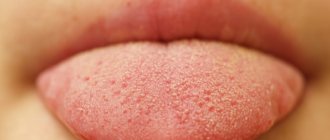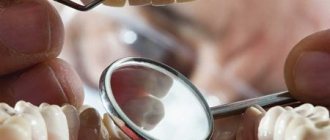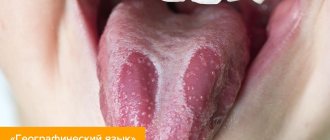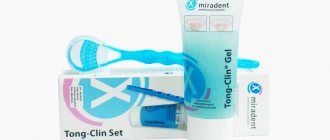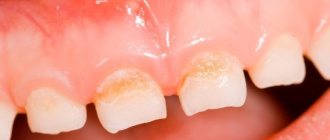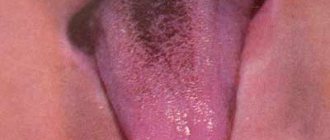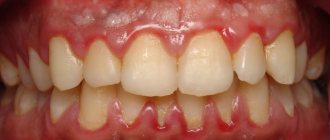Plaque on the teeth and tongue is a common phenomenon for everyone. It’s another matter when it acquires an unusual color: black, brown or green. In most cases, this is due to poor oral hygiene and bad habits, but in fact there are many more reasons for such a rare phenomenon. On my own green coating on the tongue is quite rare. Of course, we are not talking about cases where the tongue turns green under the influence of food coloring. However, the defect causes discomfort and greatly frightens patients.
When to panic and run to the doctor if you find a green coating
In the morning, almost all people develop a small white-yellow coating on the tongue, which disappears after hygienic cleaning of the oral cavity. If this does not happen and the plaque is difficult to remove, dense, and of an uncharacteristic color, you should consult a doctor. This symptom can appear in an adult, a child, and even an infant. The tongue can have absolutely any color - from white to black, and sometimes even green. Such plaque on the tongue in adults and children most often occurs due to fungal infections, as well as as a consequence of natural aging of the body, HIV infection, diabetes mellitus or cancer. Read more about what this symptom means, why it occurs and how to treat it in today’s material.
What does pathological plaque on the tongue look like?
Before deciding what a coated tongue means and what it is talking about, that is, before making a final diagnosis, the specialist needs to carefully examine the patient’s oral cavity, and also take into account all the accompanying symptoms and complaints. A slight yellowish coating is not a reason to worry. Its formation may be associated with natural physiological processes occurring in the body. If the surface of the tongue has acquired a greenish tint, you should consult a doctor. Perhaps it is a matter of some hidden pathology. Thus, plaque may differ in the following characteristics:
- color, its intensity (we repeat that the norm is a white or slightly yellowish, easily detachable coating),
- consistency (oily, dry, curdled),
- thickness,
- localization.
Why might there be a green coating on the tongue?
What can this mean if a patient has a greenish film on his tongue and a fever? Most often, such symptoms indicate the development of an infectious process in the body. In any case, it is better to immediately consult a doctor so that he can detect the problem at an early stage and offer timely treatment.
Write a comment
Asya
July 16, 2016 at 09:34 pm
Just recently I discovered a green coating on my tongue and was horrified because it was the first time I had encountered such a thing. Before, I had never even heard that this could happen. I immediately went to the doctor, who gave me directions for some tests, after which I was found to have problems with my liver. I took the treatment prescribed by the doctor, and everything went away. I advise anyone who is faced with the same problem to immediately consult a specialist, since the causes of this plaque can be serious diseases!
Nastya
July 19, 2016 at 8:40 am
Recently I encountered the problem of a green coating on my tongue. I knew that this could come from eating too much salty and fatty foods. Just the other day before such a raid appeared, there were holidays and I overdid it too much with such meals. So the folk remedy helped to get rid of it by washing with warm water and gauze. Within a few days it was all gone.
Olga
October 1, 2016 at 12:33 pm
Of course, brushing your teeth is preventative. I really don’t understand people who brush their teeth whenever they want. A work colleague says he doesn't insist on brushing his children's teeth. As a result, we run to doctors and dentists! We need to tell her that there are excellent folk methods for keeping the oral cavity clean. I myself, in principle, have never heard of such things, I think it’s worth a try.
Violet
December 15, 2016 at 6:34 am
I had a routine check-up with the dentist and he noticed plaque. He said there was a lot of it and it was “thick.” He advised me to see a therapist and get the necessary tests. It turned out that there was a slight disruption of the gastrointestinal tract after long-term use of antibiotics. Who would have thought, I went to the dentist, but ended up treating my stomach! Thanks to the dentist, I received treatment on time.
ludochka
January 23, 2022 at 11:36 am
I drank green tea once, I always drink it and there were no side effects, but this time I bought some super natural, selected and all that. I drank it in the evening, forgot about it, before going to bed I went to brush my teeth, I looked in the mirror, and my tongue was all green. immediately go to the Internet, read what it means, I’ve read everything, I’ve already diagnosed myself, and then I remembered that I drank tea))))
Danya
January 24, 2022 at 7:20 am
This plaque usually appears due to food problems with the intestines. I had this happen in Egypt, when we ate some foreign rubbish in a cafe. After a couple of hours, vomiting, diarrhea, fever. The tongue and stool are green. It’s good that we had activated carbon with us, we drank 1 tablet per 10 kg of weight. At night it became better, the next day we drank more, and so on for 3 days, everything passed, the language became normal too. Don't eat in local cafes and always take coal with you!
Zina
January 24, 2022 at 01:37 pm
My 1.5 year old son’s tongue became green, but there were no other symptoms, no upset, no vomiting, nothing. By evening the temperature rose and a doctor was called. In the morning she came, looked, and said that it’s okay, it’s nonsense, take the pills. As a result, by the evening the child became worse, vomiting and diarrhea began. They called an ambulance and took me to the infectious diseases department.
Why does the symptom occur?
So, now let’s figure out why a suspicious green coating forms on the surface of the tongue of a child or adult. The cause of this symptom is most often associated with certain disturbances in the functioning of individual organs or internal systems:
- decreased immunity and, as a consequence, the body’s vulnerability to attack by pathogenic bacteria, or more precisely, fungi,
- improper functioning of the gastrointestinal tract, increased stomach acidity,
- irritating toothpastes and rinses,
- food products containing dyes,
- smoking,
- tongue injuries, including piercings,
- pregnancy,
- taking certain medications: hormone replacement therapy, oral contraceptives, certain antibiotics and corticosteroids.
This is what a fungal infection on the tongue looks like
“This morning I discovered green spots on my one-year-old son’s tongue. We made an appointment with the pediatrician. The doctor examined him. It turned out that antibiotics weakened the baby’s immunity. A month ago we suffered from pneumonia. The pediatrician told me to treat my mouth with a special solution.”
Yulia Egorova, 28 years old. Tobolsk
Types and associated manifestations
As part of the diagnosis, the specialist must take into account the main characteristics - first of all, the color and intensity of manifestations. Conventionally, several varieties of green plaque can be distinguished, depending on the shade, location and accompanying symptoms. Let's look at these types in more detail.
White with light green spots
A small thickness of plaque is normal. This color may appear during hot weather due to loss of moisture and dehydration. If the tongue is covered with a dense white film, the patient most likely has hyperthermia (high temperature), which indicates an inflammatory process. A sore throat combined with a symptom can trigger an upper respiratory tract infection.
Streptococcal and staphylococcal infections give rise to a white-green coating on the tongue and the presence of viscous, purulent contents on the surface of the tonsils and in the maxillary sinuses. Oral candidiasis is caused by yeast fungi of the genus Candida and also leads to the formation of a white-green plaque1.
White coating with light green spots
Yellow-green or gray-green
This symptom may be a consequence of a recent inflammatory disease of the ENT organs. Yellow-green or gray-green plaque appears in the following cases:
- pathologies of the liver and gall bladder (hepatitis, cholecystitis),
- diseases of the stomach and intestines (gastritis, gastric ulcer, duodenal ulcer, colitis),
- pathology of the duodenum (pancreatitis),
- diseases of the adrenal glands and kidneys,
- pulmonary pathologies.
Yellow-green coating on the tongue
If the color of the surface of the tongue changes and a light green coating appears, it is better to see a doctor immediately. Timely diagnosis will allow you to identify pathology at an early stage, and therefore quickly cure it.
Dark green coating
This is one of the signs of severe functional disorders of the digestive system (GIT). If nausea, vomiting, diarrhea, or general intoxication occurs, urgent assistance from an infectious disease specialist is required.
If the dark green coating is accompanied by a burning sensation, as well as growth and enlargement of the taste buds, a so-called “hairy” tongue can be diagnosed, which most often becomes a consequence of poor hygiene, dehydration, radiation therapy, long-term use of antibiotics, and too frequent consumption of coffee , tea and smoking.
Dark green coating on the tongue
Green-brown and black-green
Green-brown plaque indicates dangerous and severe pathologies of the hematopoietic system. With complicated infectious lesions of the intestines, in particular with cholera, dehydration occurs catastrophically quickly: the blood thickens, the intensity of saliva production decreases, and the black-green coating on the tongue thickens. In the absence of the necessary treatment, everything can end in death.
Green-brown coating on the tongue
Main symptoms
Since the greenish tint of the tongue is the primary sign of the development or course of the disease , upon examination it is identified by a number of signs: the thickness and density of the film is taken into account, and the difficulty of its separation from the surface of the mucous membrane of the tongue is assessed.
Main symptoms:
- Thickness. A thick layer of plaque indicates serious problems, since the pathogen has been in the body for a long time. Thin, mild plaque is often the result of infections (viruses, colds).
- Easy to separate. The plaque, which is soft and loose in structure, is easily removed, which indicates the initial stage of the disease. The manifestation of severe pathology is indicated by a dense plaque, which is removed with great difficulty.
- Consistency. Plaque can be dry, greasy, viscous, moist or curdled.
When examining a patient, the doctor first looks at the color of the tongue, so on the day of the appointment it is worth excluding any coloring foods from the diet.
How is diagnosis carried out: we establish the exact cause of the pathology
Self-diagnosis is ineffective - only a specialist can make the correct diagnosis. The therapist or dentist will conduct a visual examination and pay attention to the shade, density and volume of pathological deposits. For in-depth diagnostics, the doctor will prescribe tests and refer you to specialized specialists. You may need to take a clinical blood and urine test, an immunogram, an HIV test, as well as kidney tests to detect kidney inflammation and adrenal dysfunction.
After examination, the otolaryngologist prescribes bacterial culture of the oral mucosa for microflora and sensitivity to antibiotics. If inflammation is confirmed, the specialist will prescribe a course of antibiotic therapy for at least 7-10 days. An x-ray diagnosis of the paranasal sinuses may also be required to rule out sinusitis and sinusitis.
The gastroenterologist prescribes a biochemical blood test, fibrogastroscopy (FGS) with sampling of gastric juice, duodenal intubation and bile sampling, sigmoidoscopy to exclude ulcerative colitis. The results of these tests will help to exclude the presence of gastritis, gastric and duodenal ulcers, and diagnose hepatitis and bile duct dyskinesia. An abdominal ultrasound may also be prescribed. In severe cases, it is necessary to diagnose vascular pathologies, infectious diseases with similar symptoms and exclude cancerous tumors.
Green coating on the tongue - how to treat it
The treatment process can be short-term in the presence of easily correctable conditions. It will take more time to identify the pathology. Treatment methods in this case include the following:
- regular and high-quality oral hygiene (brush your teeth and tongue, rinse your mouth after every meal),
- rinsing with “Chlorhexidine”, “Chlorophyllipt”, “Furacilin”, “Miramistin”. The drugs are used according to the instructions,
- using a special scraper to clean the tongue,
- normalization of diet and drinking regime - you need to reduce the amount of salt consumed, give up fatty and spicy foods.
Chlorhexidine is often prescribed for the treatment of pathology.
As we have already found out, the phenomenon under consideration is not an independent pathology, but a symptom of disturbances in the functioning of internal organs and systems. Therefore, in order to get rid of the greenish coating once and for all, you need to eliminate the root of the problem.
If you have a fungal infection
As we have already noted, it is a fungal infection that is the main reason for the appearance of green deposits on the tongue. As a rule, it is localized in the oral cavity. Therefore, in such a situation, antibiotics will definitely be prescribed - but, preferably, after passing the appropriate tests. However, you shouldn’t hesitate either - the situation can be dangerous.
The specialist will also prescribe general strengthening and immunostimulating drugs, multivitamin complexes and sorbents, as well as agents that normalize intestinal microflora.
For other pathologies
Here, of course, you need to contact a specialized specialist to prescribe specific treatment - these are various drugs to normalize the functioning of the gastrointestinal tract, compliance with the drinking regime and diet.
Is it possible to use traditional medicine?
To eliminate the symptom (namely, the manifestations, but not the treatment of the underlying disease!) You can use vegetable oil. A small amount should be kept in the mouth for 15 minutes. Then spit it out and clean the surface of the tongue using a brush or a special scraper.
Gargling with medicinal herbs will help in treatment
It is also recommended to rinse your mouth with a decoction of herbs: mint, calendula, St. John's wort. To do this you need to take 15 grams. each of the herbs, brew the mixture in 250 ml of boiling water and let the product brew. You can wipe the surface of the tongue with a soda solution: 2 tbsp. You need to dilute it in 150 ml of water, then moisten a cotton pad or gauze pad in the resulting solution and cleanse it. The procedure should be repeated twice a day.
It is important to immediately note that traditional medicine can only act as a supportive therapy, but not the main one! Do not try to self-medicate, because you can not only aggravate the situation, but also trigger the pathology, bring it to the stage of development when complex and lengthy treatment, possibly even surgery, is required. You can use “grandmother’s” recipes only after agreement with your doctor.
Treatment methods
To eliminate the causes of plaque formation, it is necessary to undergo examination by a therapist at a local clinic, and if dense yellow-green deposits occur, consult a gastroenterologist.
It is necessary to exclude the presence of diseases inside the body, otherwise local treatment will only provide temporary results , because the symptoms will go away, but the causes of their occurrence will not be eliminated.
Depending on the results of a general examination of the body and the severity of local symptoms, antifungal drugs may be prescribed , taking into account the age-specific dosage: nystin, levorin, fluconazole or decamin.
Simultaneously with taking medications, rinsing with antiseptic solutions : miramistin, chlorhexidine, chlorophyllipt, furatsilin or potassium permanganate.
If, upon examination by a doctor, no pathological changes are found in the body, this means that the problem of plaque formation is hygienic.
The dentist will help you choose a more effective toothpaste and special solutions for morning rinses.
You can clean your tongue yourself, using a special device, but this procedure is not suitable for everyone, as it causes a gag reflex in some.
How to remove hygienic green plaque from the tongue using home remedies, watch the video:
Traditional medicine also has effective remedies to help get rid of green plaque on the tongue:
- Brew flax seeds, strain and drink on an empty stomach - the decoction removes deposits and stabilizes the functioning of the intestines and other digestive organs.
- Dissolve 2 tsp in 200 ml of warm water.
soda, moisten gauze in the resulting solution and wipe the tongue area, removing plaque. Repeat the procedure up to 4 times a day for a decade. - From the herbal collection: oregano, linden blossom, yarrow, plantain - make an infusion: pour 20 g of the dry mixture with a glass of boiling water, leave for 2.5 hours, strain.
Take the product 100 ml three times a day. - Quickly remove green deposits by rinsing with infusions of mint, sage, chamomile and strawberries. 4 tbsp. l. Pour boiling water over the prepared mixture, leave for an hour, strain and rinse your mouth at least 5 times a day.
Let's find out how to clean teeth from yellow plaque and prevent its appearance.
In this article we will look at the question of when to start brushing your child’s teeth.
Here https://www.vash-dentist.ru/lechenie/bolezni-polosti-rta/sposobyi-yazvyi.html we will talk about ways to treat white ulcers in the mouth.
Prevention measures
To minimize any risk of an unpleasant symptom, competent and systematic prevention of diseases of the oral cavity and digestive system should be ensured. In this regard, experts suggest being guided by the following principles:
- double daily brushing of teeth and oral cavity,
- rejection of bad habits,
- normalization of diet and drinking regime,
- use of multivitamin preparations,
- undergoing preventive examinations for early diagnosis of pathologies,
- timely treatment of chronic diseases.
The tongue serves as a kind of indicator of the state of the whole organism. If spots, dense plaque of an unhealthy color, or suspicious growths appear on its surface, you should immediately run to the doctor. The sooner you seek help from a professional, the easier and faster the problem can be resolved.
- Banchenko G.V. Language is the “mirror” of the body: a clinical guide for doctors, 2000.
Preventive measures
The following manipulations are recommended as preventive measures to prevent the formation of green plaque:
- Perform hygienic procedures to clean not only the teeth, but also the entire oral cavity in a timely and high-quality manner.
- Review your diet, getting rid of harmful foods, such as: smoked foods, fried and sweet foods, semi-finished products, products containing preservatives and dyes. When creating a menu, preference should be given to fresh vegetables, fruits, cereals, dried fruits, nuts and legumes.
- Bad habits cause many problems. Living with caution, using suspicious pleasure is a relic of the past. Nothing improves health and psycho-emotional state better than sports and an active lifestyle.
- Don't forget about regular cleaning of your home. Accumulated dust often creates problems in the upper respiratory tract.
- Regularly support the immune system by enriching the body with complex vitamins and fresh fruits/vegetables.
- You need to ventilate your home every day to purify the air and create a healthy microclimate.
- If green plaque is detected, you should not self-medicate, much less ignore the symptom. Early diagnosis helps to quickly eliminate health problems, while reducing treatment time and costs.
After visiting the doctor, you must follow all instructions, otherwise the treatment will be ineffective.
